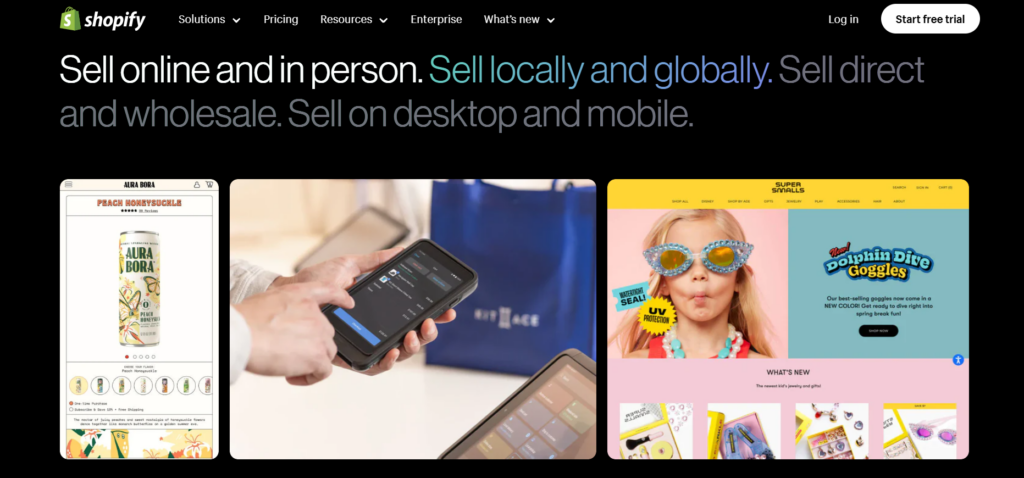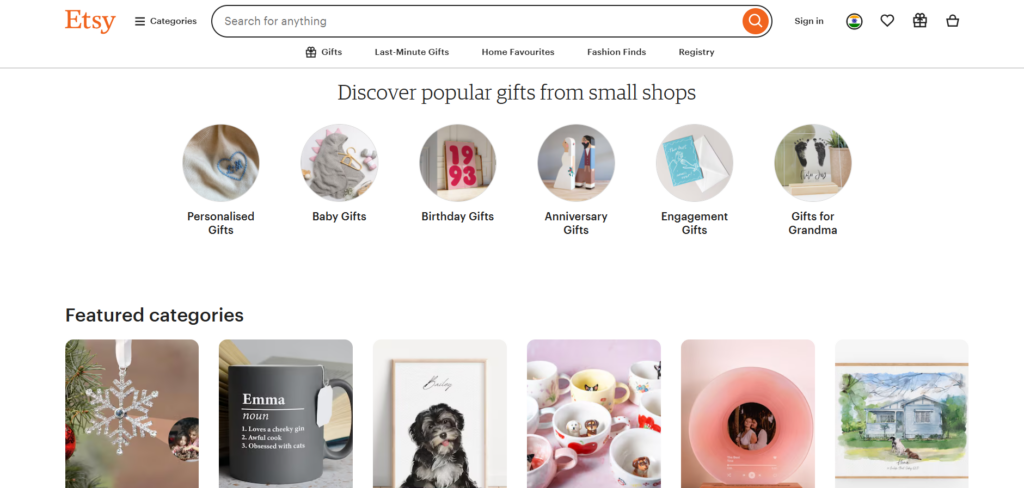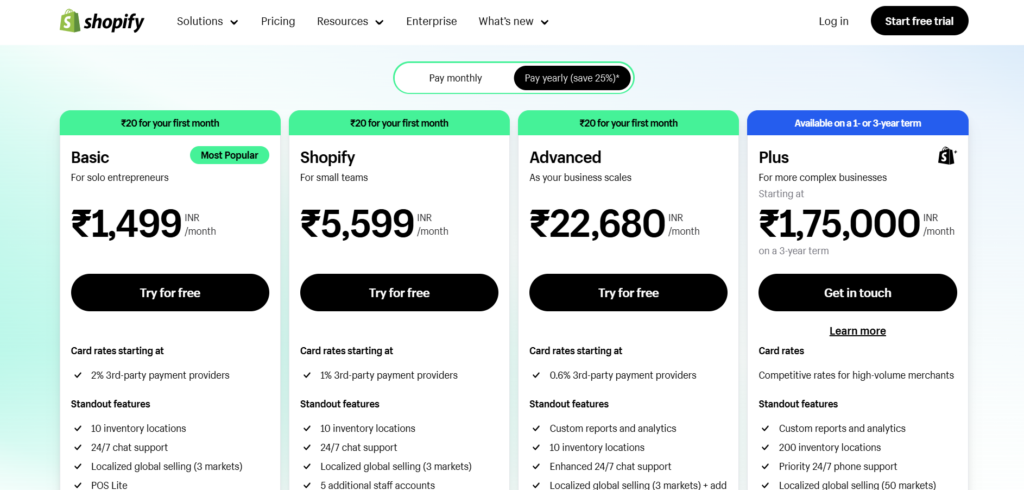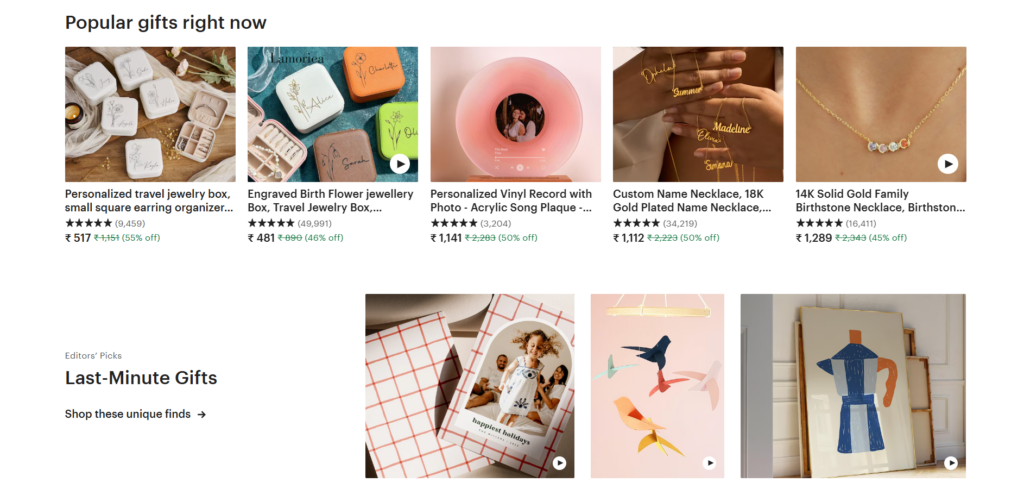When I first looked into Shopify and Etsy, I wasn’t sure which one was the better fit for my business. Both platforms are great, but they’re built for different needs.
Shopify is like having your own online store where you control everything—branding, design, and how you sell. Etsy, on the other hand, is a popular marketplace full of shoppers looking for handmade, vintage, or unique items.
If you want to build your brand and scale your business, Shopify is a great choice. But if you’re looking for a quick way to start selling and tap into an existing audience, Etsy might be better. The downside? Etsy’s fees can add up, and you’re competing with other sellers on the platform.
In this comparison, I’ll break down their features, pricing, and who they’re best for so you can decide which one you should invest in.
Shopify
Shopify is a leading e-commerce platform that enables individuals and businesses to create and manage online stores with ease.

It offers a comprehensive suite of tools for website design, payment processing, inventory management, and marketing.
Shopify supports businesses of all sizes, from small startups to large enterprises, with customizable templates, integrations, and apps. Its user-friendly interface and powerful backend make it accessible for non-technical users while providing advanced features for developers.
Shopify also supports multichannel selling, allowing businesses to connect with customers across social media, marketplaces, and brick-and-mortar locations, empowering entrepreneurs to grow and scale their online presence efficiently.
[button-red url=”https://digitalmarketerr.com/recommends/shopify/” target=”_blank” position=”center”]🔥Try Shopify Now[/button-red]
Etsy
Etsy is an online marketplace specializing in handmade, vintage, and unique goods, connecting sellers with a global audience. It offers an easy-to-use platform with built-in traffic, making it ideal for small-scale artisans and crafters.

However, Etsy charges various fees, including a $0.20 listing fee, a 6.5% transaction fee, and payment processing fees, which can add up quickly.
The marketplace’s branding and competitive environment can overshadow individual sellers, limiting brand growth and visibility.
While Etsy is great for starting out, its fee structure and marketplace dynamics make it less suitable for scaling businesses compared to independent e-commerce platforms like Shopify.
[button-red url=”https://www.etsy.com/in-en/” target=”_blank” position=”center”]🔥Try Etsy Now[/button-red]
Features Comparison: Shopify vs Etsy
Here’s a detailed comparison of Shopify and Etsy to help you evaluate their features:
1. Platform Type
Shopify: Standalone store; you have full control over your website design, functionality, and branding.
Etsy: Marketplace; you share the platform with other sellers, and your store is part of Etsy’s ecosystem.
2. Ease of Use
Shopify: Requires some setup and design work; user-friendly drag-and-drop editor.
Etsy: Ready-to-use marketplace; minimal setup required.
3. Customization
Shopify:
- Offers extensive customization with templates, themes, and apps.
- Allows coding (HTML/CSS) for advanced customization.
Etsy:
- Limited customization since branding and layout are standardized.
- Focus is more on listing products than customizing storefronts.
4. Branding
Shopify:
- Full control over your branding, including domain name (e.g., yourstore.com).
- No competing sellers on your website.
Etsy:
- Limited branding; your store is under Etsy’s domain (e.g., etsy.com/shop/yourstore).
- Competes with other sellers for customer attention.
5. Marketing and SEO
Shopify:
- Advanced SEO tools and custom meta descriptions.
- Email marketing integration and social media tools.
- Paid ads (Google, Facebook, etc.) are fully controlled by you.
Etsy:
- Built-in marketplace traffic.
- Limited SEO control; Etsy prioritizes search ranking within its own platform.
- Etsy Ads to promote listings.
6. Scalability
Shopify:
- Highly scalable; ideal for growing businesses.
- Supports large catalogs and global selling with multi-language and currency features.
Etsy:
- Limited scalability; works best for niche or small-scale operations.
7. Payment Options
Shopify:
- Wide range of payment gateways, including Shopify Payments, PayPal, Stripe, and others.
- Multi-currency support.
Etsy:
- Payments are processed through Etsy Payments, offering limited options.
8. Customer Base
Shopify:
- You drive your own traffic through marketing.
- Customer data and email lists belong to you.
Etsy:
- Access to Etsy’s large, established audience.
- Limited access to customer data.
9. Support
Shopify:
- 24/7 customer support via chat, email, and phone.
- Extensive help center and community forums.
Etsy:
- Email and chat support with less emphasis on one-on-one guidance.
- Help center and forums tailored to marketplace users.
Why Shopify is the Better Choice
1. Brand Identity: Shopify gives you a unique, professional storefront, while Etsy limits you to a marketplace setting.
2. Ownership: With Shopify, you own your customer relationships and data; on Etsy, you’re dependent on their platform and policies.
3. Scalability: Shopify adapts as your business grows, while Etsy is designed for smaller operations.
4. Lower Long-Term Costs: Etsy’s fees can add up significantly, making Shopify more cost-effective in the long run.
5. Flexibility: Shopify supports a wide variety of products, payment methods, and marketing tools.
Pricing Comparison: Shopify vs Etsy
Shopify Pricing
Shopify offers a range of pricing plans tailored to various business needs in India:

1. Starter Plan:
Priced at ₹399 per month, this plan is ideal for selling products through social media platforms and messaging apps. It does not include a full online store but allows for the creation of product links and buy buttons.
2. Basic Shopify:
At ₹1,499 per month (billed annually), this plan provides a complete online store with unlimited products, two staff accounts, and basic reports. It’s suitable for new businesses starting their online presence.
3. Shopify:
For ₹5,599 per month (billed annually), this plan includes all Basic features plus professional reports, five staff accounts, and standard reporting capabilities, making it ideal for growing businesses.
4. Advanced Shopify:
At ₹22,680 per month (billed annually), this plan offers advanced report building, up to 15 staff accounts, and third-party calculated shipping rates, catering to larger businesses with more complex needs.
5. Shopify Plus:
Starting at ₹1,75,000 per month on a 3-year term, this enterprise-level solution provides advanced features and customization options for high-volume businesses.
Please note that transaction fees apply when using third-party payment providers, varying by plan. Additionally, Shopify periodically offers promotional rates, such as ₹20 for the first month on select plans.
[button-red url=”https://digitalmarketerr.com/recommends/shopify/” target=”_blank” position=”center”]🔥Try Shopify Now[/button-red]
Etsy Pricing

1. Listing Fees
- Cost: $0.20 per item.
- Duration: Each listing is active for 4 months or until the item is sold.
- Renewal: Listings automatically renew, incurring another $0.20 fee per renewal.
2. Transaction Fees
Rate: 6.5% of the total sale price, including the item price, shipping cost, and any gift wrapping fees.
3. Payment Processing Fees
- Varies by country.
- In the United States: 3% + $0.25 per transaction.
- Fees differ in other countries based on local payment standards.
4. Etsy Advertising Fees
- Etsy Ads: Optional promotional tool; sellers set a daily budget.
- Offsite Ads: Etsy charges a 12%-15% fee on sales generated through its external advertising, depending on the shop’s annual revenue.
5. Optional Etsy Plus Subscription
- Cost: $10/month.
- Features: Includes advanced tools like customizable shop features, advertising credits, and discounts on custom domains.
[button-red url=”https://www.etsy.com/in-en/” target=”_blank” position=”center”]🔥Try Etsy Now[/button-red]
Summary: Why Shopify is Better
| Feature | Shopify | Etsy |
|---|---|---|
| Monthly Costs | Fixed ($39–$399/month) | Variable, depends on sales. |
| Listing Fees | None | $0.20/item every 4 months. |
| Transaction Fees | 2.9% + $0.30 (lower with Shopify Payments) | 6.5% of item + shipping + gift wrap. |
| Ad Fees | Optional, controlled by seller. | 12%-15% for Offsite Ads (mandatory). |
| Profit Margins | Higher due to predictable costs. | Lower due to cumulative fees. |
| Scalability | Ideal for growing businesses. | Costs grow disproportionately. |
Shopify’s transparent pricing, lack of listing fees, and scalability make it the better choice for businesses looking to maximize profits and grow sustainably.
[button-red url=”https://digitalmarketerr.com/recommends/shopify/” target=”_blank” position=”center”]🔥Try Shopify Now[/button-red]
Buying Guide: How To Choose Your Ecommerce Platform
Need help with your decision? To help you choose between Shopify and Etsy, these are the standout features of each platform:
Choose Shopify If…
- You’re a medium-large business with scaling inventory. Shopify’s inventory tools will help you manage and grow your stock.
- You want built-in marketing features to help you grow online. You can access email marketing and multi-channel integration.
- You desire more creative control over your website’s design through customizable templates.
- You want a large number of different payment options to choose from.
Choose Etsy If…
- You specialize in handmade, vintage, or craft goods, which is Etsy’s main focus.
- You’re a smaller store with moderate inventory.
- You want immediate access to a large number of potential customers – without needing to spend time on marketing.
The Final Verdict
Shopify is the better choice for businesses seeking full control, scalability, and a personalized online presence.
While Etsy works well for small-scale sellers within its niche marketplace, it limits branding opportunities and charges transaction fees.
Shopify provides a standalone platform with customizable templates, advanced e-commerce tools, and no reliance on a shared marketplace.
Its flexibility and growth potential make it ideal for businesses aiming to establish their brand and expand independently, making Shopify the superior option over Etsy.
[button-red url=”https://digitalmarketerr.com/recommends/shopify/” target=”_blank” position=”center”]🔥Try Shopify Now[/button-red]
FAQ’s
What’s the main difference between Shopify and Etsy?
Shopify is a standalone e-commerce platform, while Etsy is a marketplace for handmade and vintage items.
Which platform has lower fees?
Shopify offers predictable costs, whereas Etsy charges cumulative fees including listing, transaction, and ad fees.
Which is better for branding?
Shopify provides full control over branding, while Etsy emphasizes its marketplace brand.
Which is better for scaling a business?
Shopify scales efficiently with features for growing businesses; Etsy’s fees increase with sales.
Do both platforms allow custom websites?
Shopify enables custom websites; Etsy is a shared marketplace without standalone site options.
